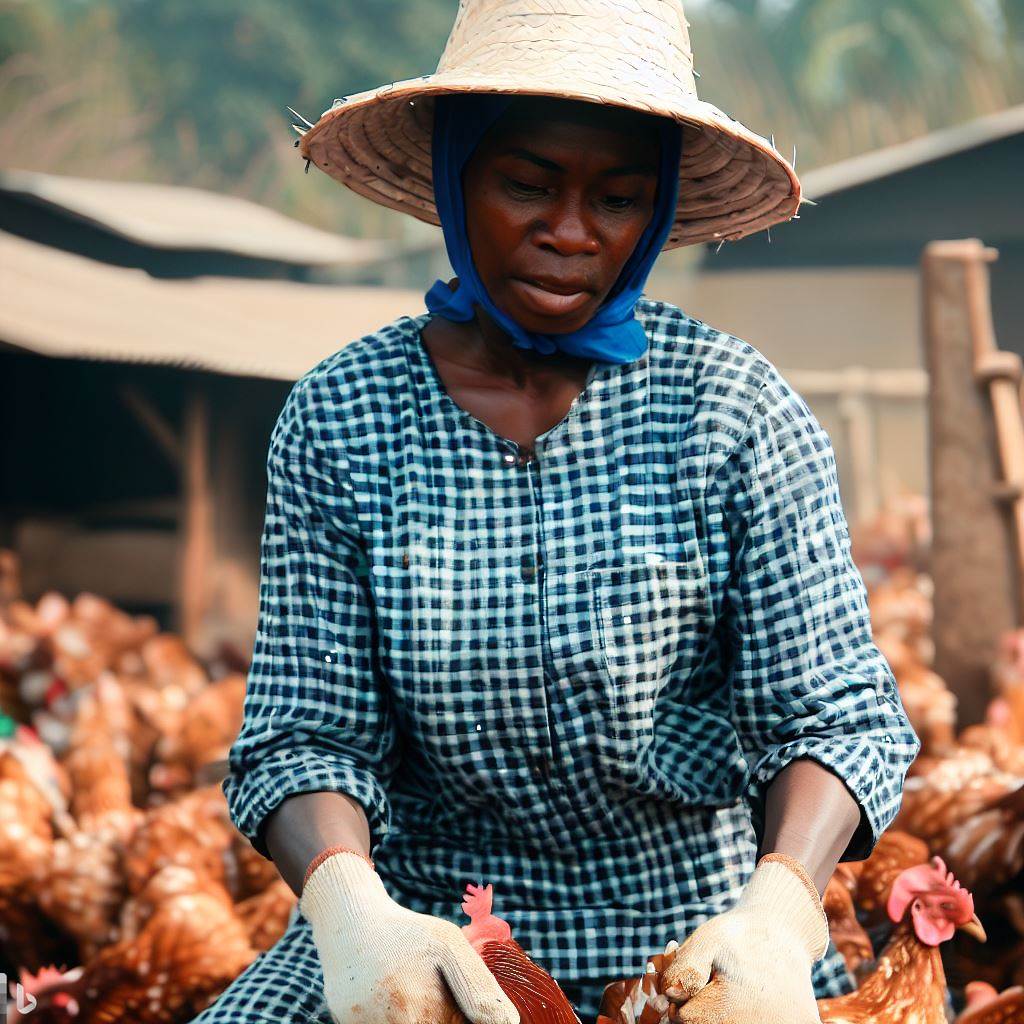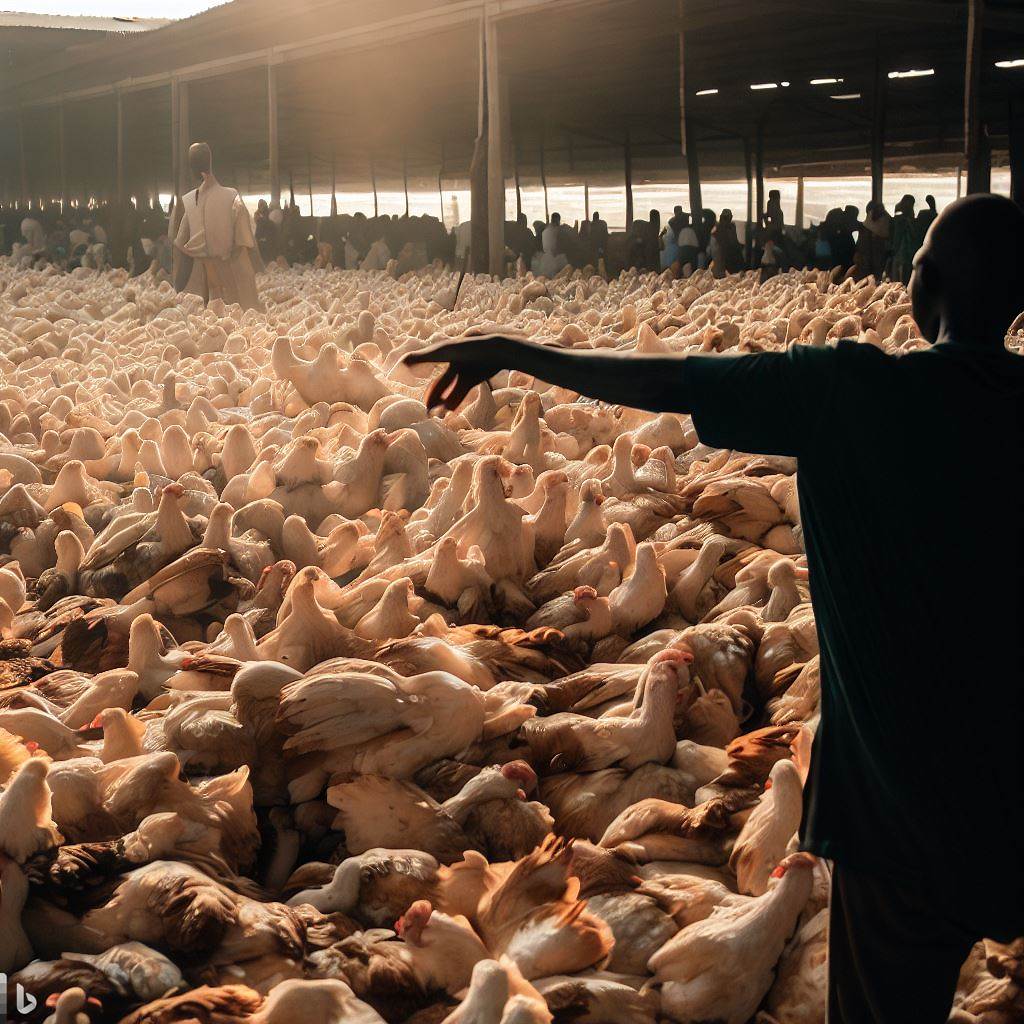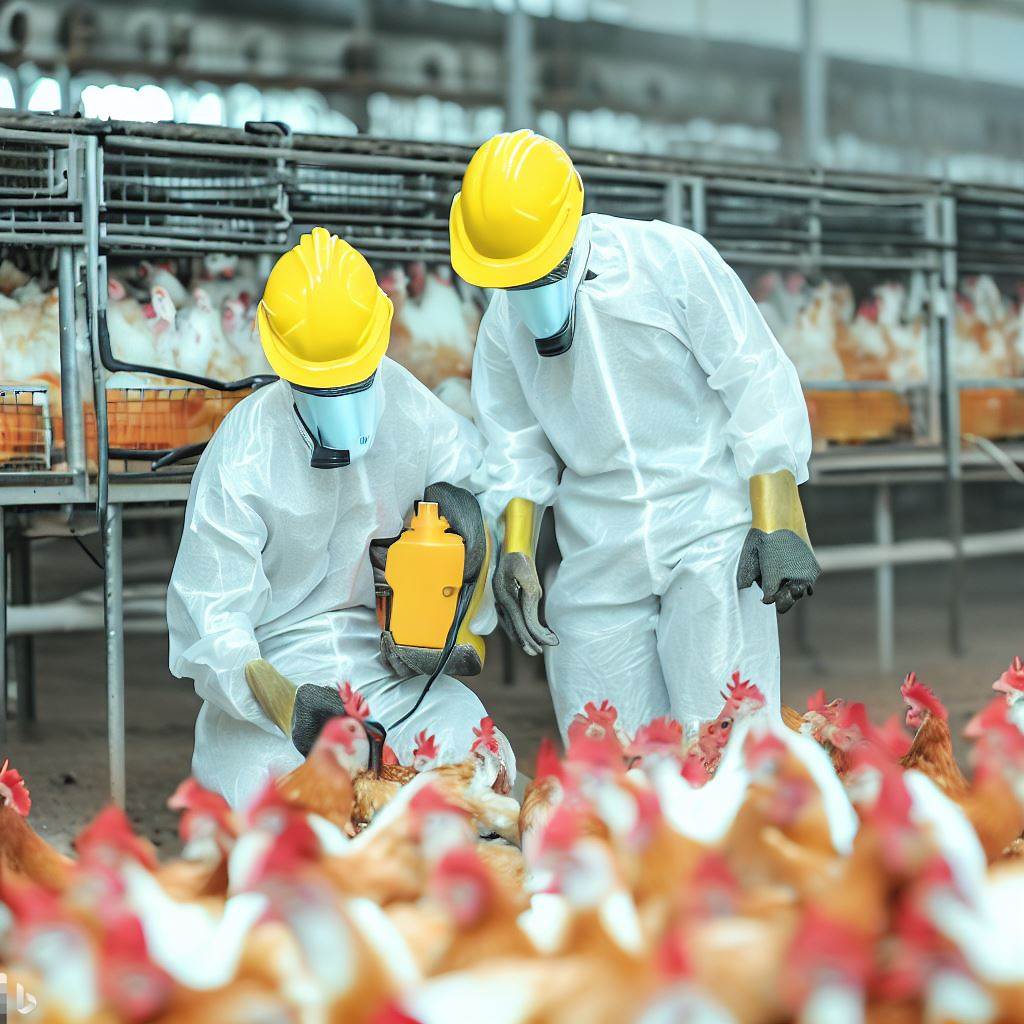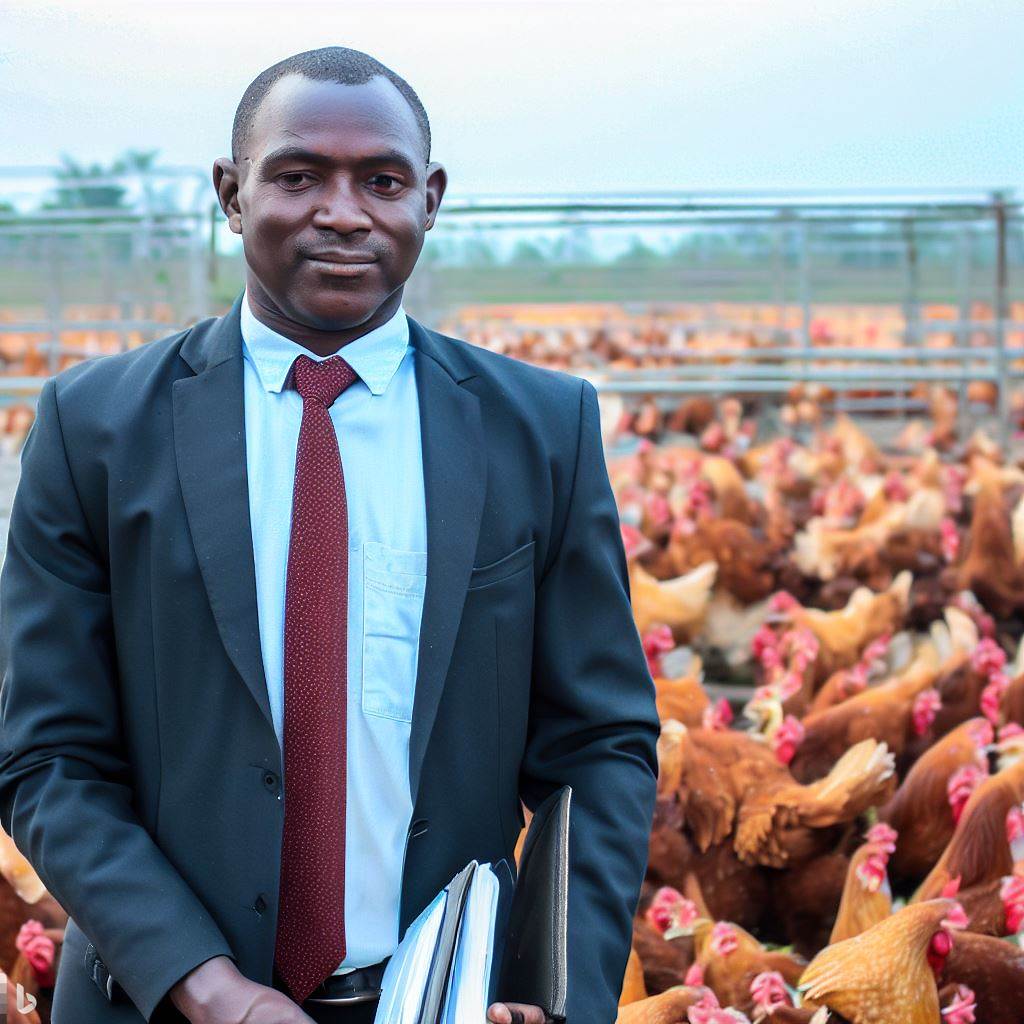Introduction
The significance of Nigeria’s poultry industry cannot be overstated, as it not only bolsters the economy but also nurtures employment opportunities and bolsters food security.
This blog post delves into the intricate tapestry of a typical day in the life of a Nigerian poultry farmer.
Nigeria’s economy finds a substantial pillar in its poultry industry, a sector that not only generates employment but also plays a pivotal role in ensuring food security.
This exploration takes us through the daily chronicles that define the existence of a Nigerian poultry farmer.
Starting the Day
The typical morning routine of a Nigerian poultry farmer
A typical morning routine for a Nigerian poultry farmer starts by waking up early to feed and water the chickens.
The farmer must ensure that the birds are properly nourished to promote their growth and health.
After feeding the chickens, the farmer moves on to cleaning and maintaining the poultry house.
This involves removing waste, such as feces and leftover feed, to maintain a clean and hygienic environment for the birds.
In addition to cleaning, the farmer checks the overall health and well-being of the birds.
This includes observing their behavior, examining their feathers and skin, and monitoring their overall activity levels.
To ensure the birds’ health, the farmer also checks for any signs of illness or disease. This may involve examining the birds’ eyes, beaks, and respiratory systems for any abnormalities.
It is crucial to identify and address any health issues early on to prevent the spread of diseases and minimize potential losses.
A checklist of tasks for a Nigerian poultry farmer’s morning routine may include:
- Wake up early
- Feed and water the chickens
- Clean and maintain the poultry house
- Check the health and well-being of the birds
- Look for signs of illness
The cornerstone of a poultry farm’s triumph lies in its morning routine. This foundational practice kickstarts productivity by tending to the chickens’ essentials early on.
For Nigerian poultry farmers, dedication and patience are pivotal in this routine. It demands rising early, even on weekends, to provide unwavering care to the flock.
Transform Your Career in Nigeria
Discover unmatched expertise with our personalized Career Consulting service. Navigate Nigeria’s job market with a strategy tailored just for you.
Get StartedDocumenting egg count and collection are also part of the morning regimen. This data aids in monitoring productivity and detecting anomalies.
This life involves both physical exertion and vigilance. It mandates proactive bird care and a pristine environment.
Through this structured dawn regimen, Nigerian poultry farmers effectively steer their operations, bolstering the nation’s poultry industry to meet demands.
It’s a challenging yet gratifying endeavor that defines the life of a Nigerian poultry farmer.
Feeding and Nutrition: Explaining the Importance of Proper Nutrition for the Chickens
Proper nutrition plays a crucial role in the success of a Nigerian poultry farmer.
A balanced diet ensures that the chickens grow healthy and produce high-quality eggs.
Let’s dive into the types of feed and supplements used in Nigerian poultry farming.
The Types of Feed and Supplements Used in Nigerian Poultry Farming
1. Starter Feed
- Rich in proteins and essential nutrients, starter feed is given to newly hatched chicks.
- It promotes healthy growth, strong immune system development, and optimal digestive function.
2. Grower Feed
- As the chicks grow older, they require a different nutritional profile.
- Grower feed contains moderate protein levels and helps the birds develop strong bones and muscles.
3. Layer Feed
- When the pullets reach maturity, they transition to layer feed.
- This feed is rich in calcium and other nutrients necessary for egg production.
4. Supplements
- Poultry farmers often provide additional supplements to meet specific nutritional needs.
- These supplements may include vitamins, minerals, probiotics, and herbal extracts.
Breaking Down the Feeding Schedule Throughout the Day
Now that we understand the types of feed, it’s essential to discuss the feeding schedule.
1. Morning
- The day begins with the poultry farmer ensuring fresh and clean water is available.
- Chickens are then given their breakfast, consisting of the appropriate feed based on their age.
2. Mid-Morning
- Some farmers choose to offer mid-morning snacks to keep the chickens active and engaged.
- These snacks may include grains or fruits.
3. Afternoon
- The afternoon feeding is similar to breakfast, with the chickens receiving another serving of feed.
- The farmer carefully monitors the chickens, making sure they consume enough to sustain their energy levels.
4. Evening
- Before sunset, the chickens are fed their last meal of the day.
- This feeding ensures they have enough nutrients to rest and recover during the night.
The Farmer’s Efforts to Ensure a Balanced Diet for the Birds
A responsible Nigerian poultry farmer takes great care to provide a balanced diet to the chickens.
1. Ensuring Quality Feed
- The farmer sources feed from reputable suppliers to guarantee the highest nutritional value.
- This reduces the risk of contamination and ensures consistency in the birds’ diet.
2. Monitoring Nutritional Content
- The farmer regularly tests the feed and supplements to ensure the required nutritional content.
- By doing so, the farmer can adjust the diet if necessary and maintain the optimal health of the birds.
3. Balanced Formulation
- The farmer carefully formulates the feed, considering the specific needs of each growth stage.
- This includes striking the right balance of proteins, carbohydrates, fats, vitamins, and minerals.
4. Consultation with Experts
- Expert advice is sought to ensure that the chickens receive the best possible nutrition.
- Veterinarians and nutritionists provide guidance on feed formulation and supplementation.
In the end, proper nutrition is of utmost importance in Nigerian poultry farming.
The types of feed and supplements, along with a well-structured feeding schedule, contribute to the overall health and productivity of the chickens.
By making diligent efforts to provide a balanced diet, the Nigerian poultry farmer ensures the success of their operation.
Disease Prevention and Health Care
Disease prevention is vital in Nigerian poultry farming, considering the nation’s growing population and poultry demand.
Ensuring bird health is tough due to various challenges. This blog post delves into Nigerian poultry farmers’ struggles with disease prevention and their strategies for maintaining farm biosecurity.
Biosecurity is pivotal, involving access control, movement restriction, and regular disinfection. These practices thwart pathogen entry.
Vaccination is key, following expert schedules, and administered via different methods for immunity.
Medication, including antibiotics, combats disease, is administered with caution to prevent antibiotic resistance.
Yet, challenges persist. Limited access to quality vaccines and medications hinders preventive measures.
Common diseases like Newcastle and avian influenza pose threats, demanding swift identification.
Experience and industry networks aid farmers, enabling knowledge exchange.
In essence, Nigerian poultry farmers grapple with disease prevention.
Biosecurity, vaccination, and medication aid them, yet access issues and prevailing diseases complicate efforts.
Shared experiences foster growth in the Nigerian poultry sector.
Read: Top Challenges Faced by Nigerian Poultry Producers
Publish Your Professional Profile, Business or Brand
Showcase your expertise, gain trust, and boost visibility instantly on Professions.ng.
Publish Now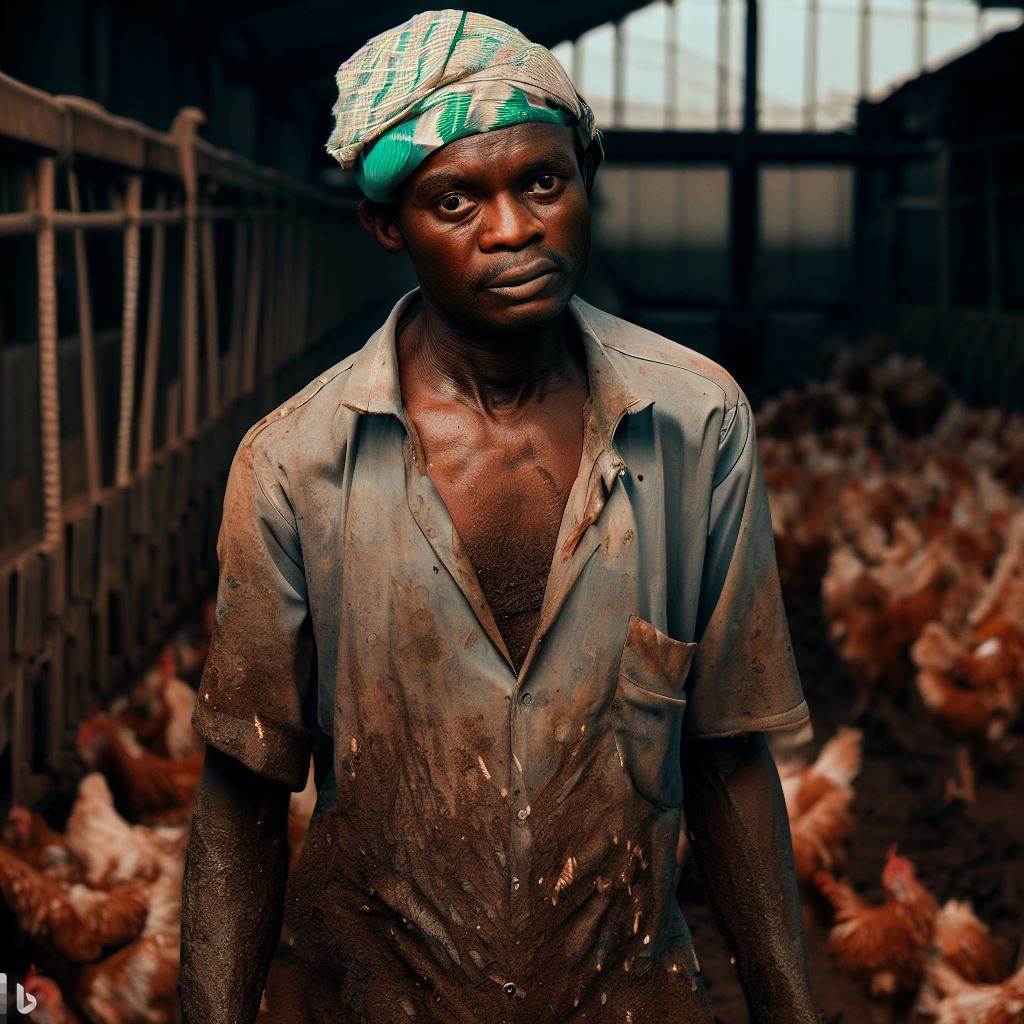
Managing the Poultry House
Maintenance and Cleanliness Practices
- Regularly inspect the poultry house to identify and repair any damaged areas or equipment.
- Clean and sanitize the house thoroughly before and after each batch of birds.
- Remove and dispose of all litter and manure to prevent the spread of diseases.
- Ensure proper drainage in the poultry house to avoid water accumulation.
- Implement a rodent control system to keep pests away from the birds.
Ventilation and Temperature Control Methods
- Install fans and vents to provide adequate air circulation and prevent heat stress in the birds.
- Use automated temperature control systems to maintain optimal temperature levels.
- Monitor temperature and humidity regularly to ensure the birds’ comfort and productivity.
- Clean air filters and fans frequently to prevent dust accumulation and maintain good air quality.
Strategies for Managing Waste and Minimizing Odor
- Utilize proper waste disposal methods such as composting or recycling.
- Separate manure and litter from other waste to facilitate effective management.
- Regularly remove excess waste from the poultry house to avoid odor buildup.
- Implement the use of odor-control products or natural alternatives like herbs and spices.
- Implement strict biosecurity measures to prevent the introduction and spread of diseases.
Techniques for Preventing Predators and Ensuring Security
- Maintain a secure perimeter around the poultry house, using fences and gates.
- Install effective lighting systems to deter predators from approaching the farm at night.
- Use predator-proof enclosures and netting to protect the birds from predators.
- Employ guard animals, such as dogs or trained birds, to scare away potential predators.
- Regularly inspect the poultry house for any signs of damage or potential entry points for predators.
By implementing these practices, a Nigerian poultry farmer can effectively manage the poultry house, ensuring the cleanliness and hygiene necessary for the birds’ health and productivity.
Read: Effective Strategies for Poultry Production in Nigeria
Egg Collection and Processing
As a Nigerian poultry farmer, one of the most important aspects of my daily routine is egg collection and processing.
This process involves a series of steps to ensure the eggs are clean, sorted, graded, and packaged for storage and transportation.
Egg Collection Process
- Every morning, I start the day by collecting eggs from the poultry houses.
- I carefully inspect each nest, removing any dirty or cracked eggs.
- Wearing gloves, I gently pick up the eggs, making sure not to drop or mishandle them.
- Once collected, I place the eggs in clean plastic crates for further processing.
Cleaning and Sorting Procedures
- After collection, I bring the eggs to a specially designated area for cleaning.
- I use warm water and a mild detergent to wash off any dirt or contaminants.
- Next, I carefully rinse the eggs with clean water to remove any soap residue.
- To ensure proper sorting, I examine each egg individually, looking for any imperfections.
- Cracked or damaged eggs are immediately discarded.
Grading and Packaging Steps
- Once cleaned and sorted, the eggs are ready for grading based on their quality and size.
- I use a grading scale to classify them into different categories, such as A, B, or C.
- Eggs with the highest quality and size receive an A grade, suitable for retail sale.
- Lower-grade eggs may be used for wholesale or further food processing.
- After grading, I carefully package the eggs in cartons or trays, ensuring they are protected during transportation.
Storage and Transportation of Eggs
- Proper storage is crucial to maintaining the freshness and quality of the eggs.
- I store the packaged eggs in a cool, dry room away from direct sunlight.
- Regular temperature checks are conducted to ensure optimal storage conditions.
- When it comes to transportation, I take extra precautions to prevent any damage to the eggs.
- I use refrigerated trucks or vans to maintain a consistent temperature during transit.
- The eggs are carefully loaded and secured to minimize any potential breakage.
- Upon arrival at the intended destination, the eggs are promptly unloaded and stored appropriately.
From egg collection to processing and transportation, each step in the journey of an egg is crucial to maintain its quality and freshness.
As a Nigerian poultry farmer, I take pride in ensuring that the eggs produced from my farm meet the highest standards, providing nutritious and safe products to consumers.
Read: The Role of Technology in Nigeria’s Poultry Industry
Marketing and Sales – Exploring the farmer’s strategies for selling poultry products
Running a successful poultry farming business in Nigeria goes beyond just producing high-quality poultry products.
It also involves effective marketing and sales strategies to ensure that these products reach the target customers.
Nigerian poultry farmers have their own unique set of challenges and opportunities in the market, and they need to navigate through competition while maximizing their profits.
Challenges in the Market
- High competition from other poultry farmers, both small-scale and commercial.
- Fluctuating market prices due to factors like demand, supply, and government policies.
- Limited access to capital and loans for expanding the poultry business.
- Unreliable infrastructure, such as power outages, which can affect product quality and delivery.
Strategies for Selling Poultry Products
- Building and maintaining strong relationships with local markets, wholesalers, and retailers.
- Offering diverse and value-added poultry products, such as processed meat and ready-to-cook packages.
- Developing a strong brand image and reputation for quality among consumers.
- Implementing effective advertising and promotional campaigns to reach a larger customer base.
- Providing excellent customer service to build customer loyalty and gain repeat sales.
The Role of Local Markets, Wholesalers, and Retailers
Local markets play a pivotal role in the marketing and sales of poultry products in Nigeria.
Farmers often directly sell their products in these markets, connecting with end consumers.
This offers them a better understanding of consumer preferences and allows for personalized marketing efforts.
On the other hand, wholesalers act as a link between farmers and retailers. They purchase large quantities of poultry products from farmers and distribute them to retailers in various locations.
Wholesalers play a crucial role in ensuring the consistent supply of products to meet the demand of retailers.
Retailers, including supermarkets, butchers, and small grocery stores, are the final touchpoints in the poultry product distribution chain.
They sell poultry products directly to consumers. Retailers strive to meet consumer demands by offering a variety of options, including different cuts of meat and poultry parts.
Competing in the Market
Navigating competition in the poultry market requires strategic thinking and adaptation.
Nigerian poultry farmers must constantly assess market trends, monitor competitors, and adjust their marketing and sales strategies accordingly.
They need to differentiate their products, offering unique value propositions to attract and retain customers.
Diversification is also crucial. Farmers can explore new markets, such as supplying poultry products to restaurants, hotels, and institutions.
Additionally, embracing technology and digital marketing can help reach a wider audience and increase brand visibility.
Collaboration within the industry is another approach.
Poultry farmers can form cooperative societies, enabling them to pool resources, negotiate better deals with suppliers, and jointly participate in marketing activities.
In general, marketing and sales strategies are vital for Nigerian poultry farmers to succeed in the competitive market.
Understanding the challenges and opportunities, building strong connections with local markets, wholesalers, and retailers, and adapting to market dynamics are key to thriving in the poultry business.
Read: Sustainable Practices for Poultry Producers in Nigeria
Conclusion
Being a Nigerian poultry farmer is a challenging yet vital role in ensuring food security.
The daily responsibilities include feeding, cleaning, and monitoring the health of the birds. Poultry farmers also face challenges such as disease outbreaks and market fluctuations.
Nigerian poultry farmers play a crucial role in contributing to food security by providing a steady supply of eggs and poultry meat.
Their hard work and dedication help to meet the demands of a growing population.
As readers, we can support local poultry farmers by consuming their products.
By buying locally, we not only contribute to the growth of the local economy but also encourage sustainable farming practices.
Let us appreciate the efforts of Nigerian poultry farmers and make a conscious choice to support them.
By choosing their products, we are not only ensuring our own access to safe and high-quality food but also promoting the growth of the agricultural sector in Nigeria.

